La Chinoise Blu-ray Movie
HomeLa Chinoise Blu-ray Movie 
Arrow AcademyArrow | 1967 | 96 min | Rated BBFC: PG | Apr 23, 2018
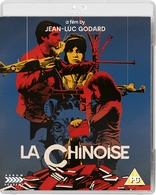
Movie rating
7 | / 10 |
Blu-ray rating
| Users | 0.0 | |
| Reviewer | 4.0 | |
| Overall | 4.0 |
Overview
La Chinoise (1967)
A small group of French students are studying Mao, trying to find out their position in the world and how to change the world to a Maoistic community using terrorism.
Starring: Jean-Pierre Léaud, Anne Wiazemsky, Juliet Berto, Blandine Jeanson, Eliane GiovagnoliDirector: Jean-Luc Godard
| Foreign | 100% |
| Drama | 87% |
| Dark humor | 2% |
Specifications
Video
Video codec: MPEG-4 AVC
Video resolution: 1080p
Aspect ratio: 1.33:1
Original aspect ratio: 1.37:1
Audio
French: LPCM 2.0
Subtitles
English
Discs
Blu-ray Disc
Single disc (1 BD)
Playback
Region B (locked)
Review
Rating summary
| Movie | 4.0 | |
| Video | 4.0 | |
| Audio | 4.0 | |
| Extras | 4.0 | |
| Overall | 4.0 |
La Chinoise Blu-ray Movie Review
Reviewed by Jeffrey Kauffman May 23, 2018It’s almost hard to know where to begin with La Chinoise. Perhaps thinking of La Chinoise as a beginning itself helps, with the film serving as a kind of introduction to the screed like filmmaking that would consume Jean-Luc Godard for the next several years, as evidenced by the recently released Jean-Luc Godard + Jean-Pierre Gorin: Five Films, 1968-1971 (note that the link points to the United States release since that’s the version I reviewed, though a British release is also available). The earliest of the five films in the Godard-Gorin set, Un film comme les autres, came out in 1968, one year after La Chinoise, but one can almost feel Godard working his way toward the deconstructionist, overtly Maoist tendencies that would inform all of his collaborations with Gorin and the so-called Dziga Vertov Group. That said, La Chinoise bears more of a literary underpinning than some of the looser Godard-Gorin entries, with elements culled from Fyodor Dostoyevsky’s The Possessed, and with several other allusions to fictional works and/or characters available for those aware enough to look for them. As some of the supplements included with this release make clear, as strident as Godard seemed to be about the “New Left” and its ascension in mid-sixties France (not to mention globally), he also seemed to have a somewhat jaundiced take on so-called revolutionary activities, with no finer example being the troubling denouement of the film. There are certain aspects to La Chinoise that are intentionally dense and even obfuscatory (what else is new with Godard?), but one of the film’s most visceral elements, the insistence by at least one character that terrorism and even political assassination are the only way forward, seems almost willfully provocative, coming not all that long after the “public execution” of President Kennedy, and right before the frightful year of 1968, which saw similar killings of Kennedy’s brother and Martin Luther King, Jr.
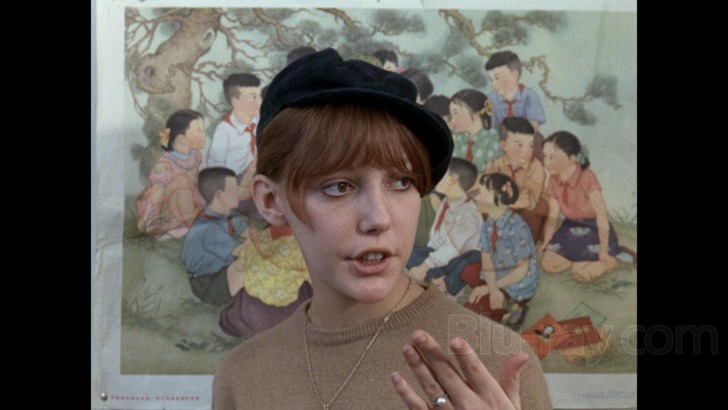
In a way, some film aficionados, even diehard fans of Godard, may find it helpful to begin with the Godard-Gorin collaborations in the previously linked set, since those films present any number of both content issues as well as stylistic proclivities that crop up in La Chinoise. The whole dialectic aspect of a bunch of avowed “student radicals” sitting around discussing sociopolitical and/or economic theory is of course part and parcel of things, but Godard frequently indulges in odd presentational aspects like having the camera drift away from whoever may be speaking, something that is one of the more remarkably memorable elements in some of the Godard-Gorin films.
The film in fact begins with a blatantly theatrical mise en scene which finds a very "stage like" assemblage of chairs and other furniture, but without one human being in frame. That of course doesn't stop Godard from having characters speaking, and right off the bat, Maoist philosophy is front and center, as it would continue to be for the ensuing several years of Godard's filmmaking. The basic "plot" of the film (if it can even be called that) deals with a quintet of student revolutionaries holed up in an apartment liberally sprinkled with primary tones of red, white and blue as they discuss the best way to achieve their anti-Capitalist aims.
The two chief characters are Véronique (Anne Wiazemsky) and Guillaume (Jean-Pierre Léaud), who are not just “co-conspirators” but also romantically involved, though Godard is really less interested in exploring the private lives of these characters than he is on focusing in on how those private choices spill into the “communal” aspect of a revolutionary movement. The film is almost willfully static most of the time, with long stretches offering very little if any camera movement, and dialogue continuing apace even when speakers aren’t able to be seen. The film does open up perhaps at least a little unexpectedly in its final act, as Véronique decides to make mere “thesis” a reality in terms of what one of the supplements refers to as the “Sino Soviet split” in terms of how to interpret Marxist Leninist doctrine. The upshot of this decision is really fascinating from any number of angles, perhaps indicating that Godard was not as thoroughly seduced by this ideology as surface elements might indicate.
La Chinoise Blu-ray Movie, Video Quality 
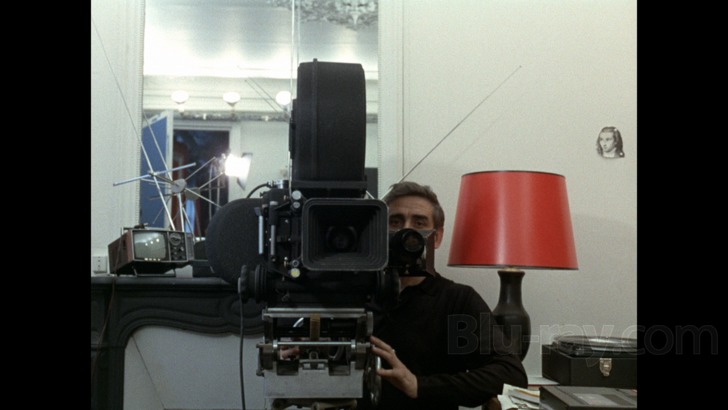
La Chinoise is presented on Blu-ray courtesy of Arrow Academy with an AVC encoded 1080p transfer in 1.33:1. Arrow's insert booklet contains only the following fairly generic verbiage about the transfer:
La Chinoise is presented in its original aspect ratio of 1.37:1 [sic] with mono sound. The film was restored by Gaumont who provided the High Definition master for this release.I haven't been able to track down any authoritative data, and am therefore uncertain as to whether this was sourced from the same master that Gaumont itself released on Blu-ray several years ago. However, in researching whether this might be a new master, I discovered that Kino Lorber's international division was advertising an imminent "new DCP" for the film, one that may have provided the source for Kino's release of the film for the United States market a few months ago, and an announcement which would seem indicate new work was being done on it somewhere. One way or the other, though, I have to say I personally noticed few if any of the "denoising corrections" Svet mentioned in his review of that release. In fact, if you look at the screenshots accompanying this review, you'll note an almost mottled grain field at times. Compare, for example, screenshot 3 from this review with screenshot 2 of the Gaumont release review and note the appearance of the grain against the background, or compare screenshot 1 from this review with screenshot 8 from the Gaumont review and a much more noticeable grain field is in evidence across Anne Wiazemsky's face. You can also look at screenshot 6 accompanying this review for an even better indication of how thick the grain can look at times. The Arrow release looks just slightly brighter to my eyes (based on screenshots), something that may account at least in part for the better resolved grain. There are some slight density variations and minor flicker that can be observed (kind of strangely anchored toward the middle of the frame at times), along with some very minor issues with age related wear like dirt. The palette is nicely suffused for the most part, with Godard's intentional choice of red, white and blue (those are not the exclusive domain of the United States, as should hopefully be obvious) resonating really well (especially the blues, which are quite vivid throughout). That said, some of the reds struck me as skewing just slightly toward orange at times. The overall color temperature seems very similar to that of the Gaumont release, but I am going solely by screenshot comparisons, always a risky gambit. Detail levels are decent in midrange shots, but tend to perk up measurably in closer coverage.
La Chinoise Blu-ray Movie, Audio Quality 
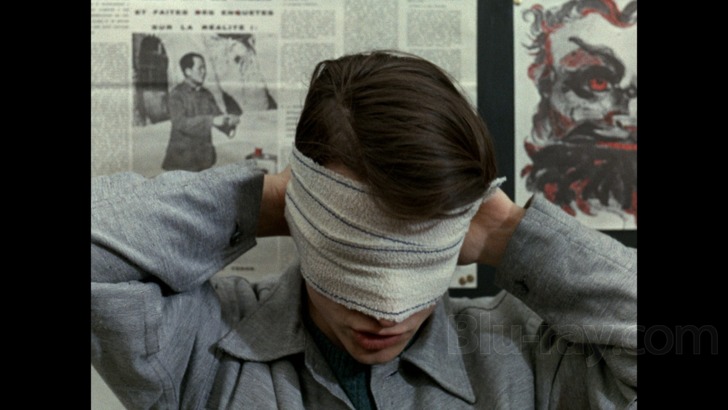
La Chinoise features an LPCM 2.0 mono track in the original French with optional English subtitles. The relatively brief use of music (including the wonderfully outré "Mao Mao" song) can sound just a bit on the boxy side at times, but otherwise this really talky film is rendered cleanly and clearly throughout. Dynamic range is pretty limited, but fidelity is fine for the most part, with no problems stemming from distortion or other damage.
La Chinoise Blu-ray Movie, Special Features and Extras 
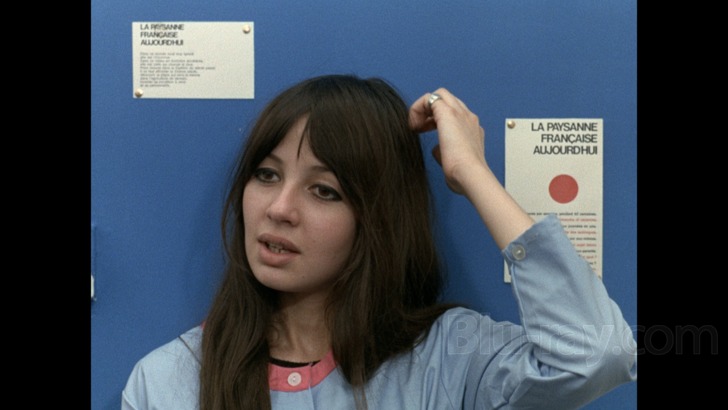
- Audio Commentary by James Quandt discusses everything from production design to some of the underlying philosophies informing the film, asking the pertinent question as to whether one should view the film as satire or propaganda.
- Interviews
- Michel Semeniako (HD; 38:24) is an engaging sit down with the actor, who discusses his work on the film, but also some background, including his New Wave film club.
- Charles Bitsch (HD; 18:59) was the first assistant on the film and reminiscences about the production.
- Jean-Claude Sussfield (HD; 17:36) was the second assistant, and has some kind of pointed comments about Godard's lack of humor on set and his passing run ins with cinematographer Raoul Coutard.
- Danitza Bantcheva on La Chinoise (HD; 18:43) is an interesting interview with the author of L'Age d'Or, as she deconstructs the Master Deconstructionist.
- Behind the Scenes Television Report (HD; 10:00) is an archival piece featuring interviews with Godard.
- Venice Film Festival Press Conference (HD; 2:22) is another archival piece which actually begins with scenes of the last day of filming. Sussfield's comments about Godard not having a sense of humor seem at least partially unfounded, since in the interview section, Godard cheekily states that "traditional" cinema is dead, and that compared to the then recent blockbuster Doctor Zhivago, he's telling stories. Take that, David Lean.
- Trailer (HD; 2:04)
La Chinoise Blu-ray Movie, Overall Score and Recommendation 
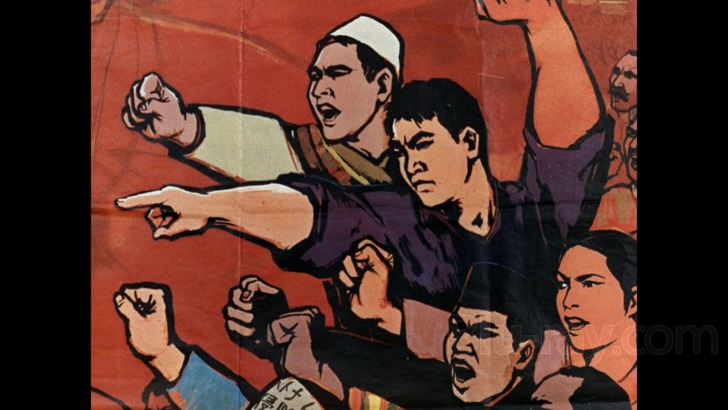
Fans of Godard, and especially fans with an inkling as to what the legendary auteur was up to at this point in his career, will find La Chinoise typically bracing if also at times intentionally frustrating and provocative. Arrow's release seems to have a more organic looking presentation than the older Gaumont offering (again, based only on non-scientific screenshot comparisons and Svet's comments on that release, so caveats should be duly noted), and Arrow has also provided almost all of the supplements Gaumont did, along with a couple of well done new ones. For Godard fans if not for the general filmgoing public, La Chinoise comes Recommended.
Similar titles
Similar titles you might also like

The Image Book
Le livre d'image
2018

Masculin Féminin
1966

Weekend
Le week-end
1967

Tout va bien
Arrow Academy
1972

Out 1
Out 1: Noli me tangere / Out 1: Spectre | Arrow Academy
1971

The Fire Within
Le feu follet / A Time to Live and a Time to Die
1963

Zama
2017

Goodbye to Language 3D
Adieu au Langage 3D
2014

Things to Come
L'avenir
2016

Breathless 4K
À bout de souffle / Vintage World Cinema
1960

Before the Revolution
Prima della rivoluzione
1964

Le Plaisir
Arrow Academy
1952

Diary of a Chambermaid
Le journal d'une femme de chambre / Vintage World Cinema
1964

Pickpocket
1959

Jules and Jim
Jules & Jim / Jules et Jim
1962

Vivre Sa Vie
My Life to Live
1962

Holy Motors
2012

Venus in Fur
La Vénus à la Fourrure
2013

Pierrot le Fou
StudioCanal Collection
1965

Theorem
Teorema
1968